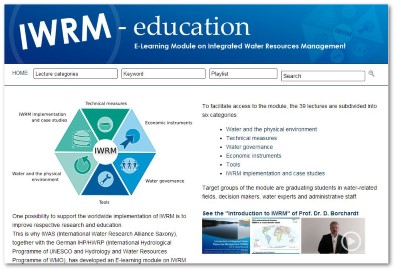Two of the persons behind the project, Dr. Steffen Niemann and Marco Leidel (representing the Helmholtz Centre for Environmental Research UFZ and Dresden University of Technology TUD) explain that the module is an attempt to reduce the complexity of IWRM by interactively linking different aspects of water management:
“The module both emphasizes the linkages between natural, social, and engineering sciences in water management, and facilitate the implementation of IWRM. It is supposed to complement classical learning options for instance at universities as well as to be used for vocational training,” say Niemann and Leidel.
Target groups for the e-learning module are predominantly graduating students in water-related fields, decision makers, water experts and administrative staff, primarily in developing and transition countries. However, as the module is available in the web, free for everyone and additionally on USB flash drives, any person interested in Integrated Water Resources Management (with access to computer and internet) can use the module.
“Most relevant topics have been chosen to fit in a comprehensive representation of current water issues. Respective academics from various universities and research institutions, as well as practitioners have been selected in order to videotape their lecture. To account for the complexity of IWRM, the currently 41 lectures are structured in six thematic clusters. Those categories assure a plausible and intuitive access to the field of IWRM: Water and the physical environment, technical measures, water governance, economic instruments, tools, IWRM implementation and case studies.”
GWP for a Wider Market
So far, the number of users has depended mainly on promotional activities at conferences, universities, or other public occasions.
“This is why we have been very active in this regard. While, according to our plans, this should still be increased, fostered, and consolidated, especially “gaining” administrative staff as target group will need considerable effort – and here maybe Global Water Partnership might be in the position to serve as some “catalyst””, say Niemann and Leidel, adding that the response to the e-module has so far been mainly positive.
Aside from this, GWP has also contributed to the e-module through one of the online presentations, a lecture on the Implementation of IWRM in Post-Soviet countries, presented by Dr. Andriy Demydenko of GWP Ukraine.
Photo: Screen capture from the homepage of the e-module.

